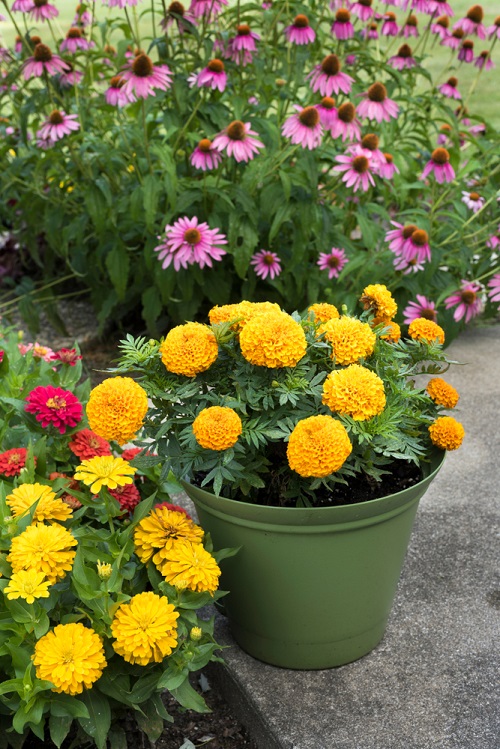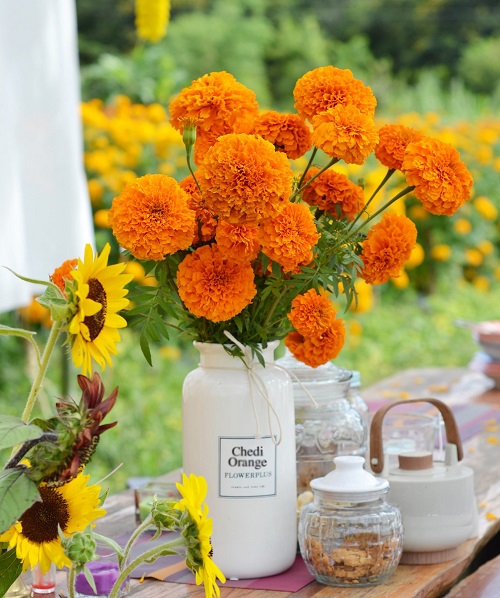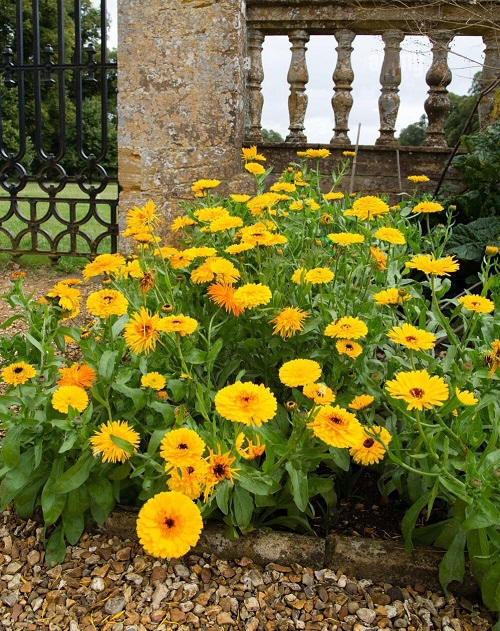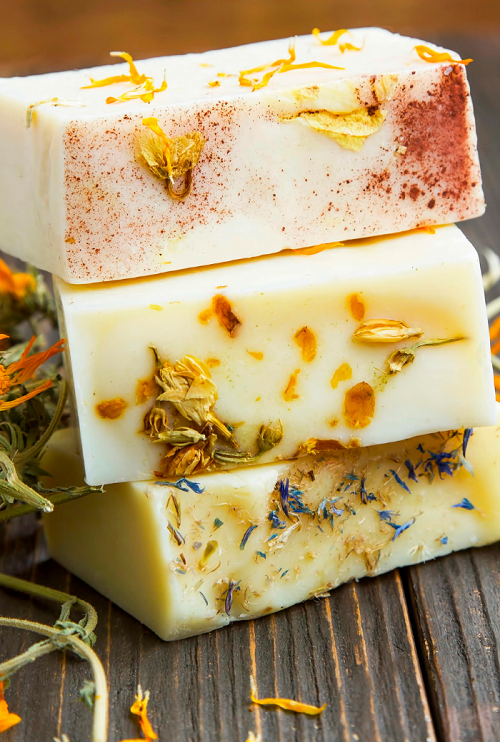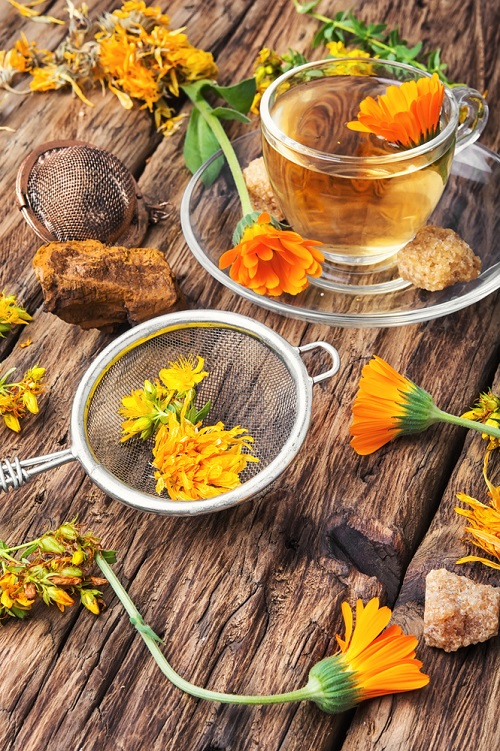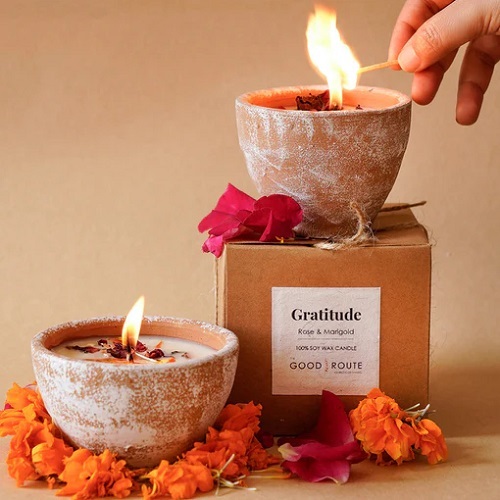Not just the pretty flowers, here are 20 best Things You Can Do With Marigolds You Never Knew About!
Marigolds are versatile plants known for their amazing orange flowers, but they are not just that; there are 20+ marigold uses in both home and garden settings you should know about.
Here is How to Grow Marigold from Cuttings
Things to Do with Marigolds You Never Knew About in the Garden
1. Companion Planting
Marigolds are known for their strong smell, which repels certain garden pests such as aphids, nematodes, and whiteflies. Planting marigolds alongside vegetables, herbs, or other susceptible plants can help deter these pests and reduce the need for commercial insecticides.
Here are 14 Companion Planting Combination Ideas
2. Nematode Control

Marigolds, particularly the Tagetes species, release natural compounds that suppress harmful nematodes in the soil. Planting marigolds in nematode-infested areas or rotating crops with marigolds can help manage these destructive nuisances.
Here are the 40 Best Organic Pest Control Approaches Every Gardener Should Know
3. Pollinator Magnet
Marigolds produce vibrant and attractive flowers that attract pollinators, such as bees and butterflies, to the garden. Their nectar-rich blooms provide a valuable food source for these beneficial insects, promoting overall garden health and pollination.
Invite these 10 Pollinators to Have the Most Productive Garden
4. Cut Flowers
Marigolds make lovely cut flowers due to their bright colors and long-lasting blooms. Harvest marigolds when they are fully open in the morning and place them in a vase filled with water for a vibrant and cheerful floral arrangement.
5. Edible Flowers

The petals of certain marigold varieties, such as Calendula officinalis (pot marigold), are edible. They can be used to add color and a mild, tangy flavor to salads, soups, or as a garnish for various culinary dishes.
Ensure you use petals from organically grown marigolds specifically designated for culinary purposes.
Here are 8 Secret Master Gardener’s Tips to Get the Most Colorful and Vibrant Flowers
6. Repelling Wildlife
Marigolds’ strong aroma can help deter certain wildlife, such as rabbits and deer, from damaging your garden plants. Planting marigolds as a border or interspersing them throughout the garden can provide some protection against these browsing animals.
7. Soil Improvement
When marigold plants are turned into the soil at the end of the season, they contribute organic matter, helping to improve soil structure, moisture retention, and nutrient content.
This practice is known as green manure or cover cropping, benefiting the overall health of the garden soil.
Look out for these 9 Signs that Show Your Soil is Bad & You Should Discard It
8. Natural Insecticide
Marigolds contain compounds, such as thiophenes and limonene, which have insecticidal properties. By crushing marigold leaves and applying them to affected plants, you can create a natural insecticide that helps control certain garden pests like aphids, mosquitoes, and whiteflies.
9. Marigold Oil
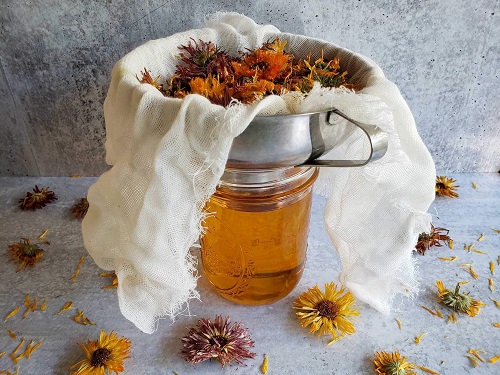
Marigold oil, or more precisely, the oils extracted from marigold flowers (Calendula officinalis), can be beneficial for garden use in a variety of ways:
- Pest Repellent: Marigold oil has been found to deter certain pests, such as aphids, nematodes, and whiteflies. This makes it a great natural pest control solution. Dilute the oil in water and spray it onto plants to repel these pests.
- Fungal Disease Control: Marigold oil can also be used to combat certain fungal diseases in the garden. It contains antimicrobial properties that can help protect plants from diseases.
10. Decorative Borders
Marigolds, with their vibrant flowers and lush foliage, make excellent border plants. They create a visually appealing and colorful edge to garden beds or walkways, adding beauty and interest to the overall garden landscape.
Besides that, you can also use marigolds in stunning container arrangements. More such ideas are posted here!
Here are 14 Stunning Flowers that Look Like Marigolds
Surprising Marigold Uses at Home
Marigolds have various uses beyond the garden. Here are some interesting things you can do with marigolds at home:
1. Natural Colorant
Use marigold petals to create natural dyes for craft projects or fabric. Boil marigold petals in water to extract their vibrant yellow or orange color and use the dye for tie-dyeing, homemade candles, or other artistic endeavors.
2. Homemade Potpourri
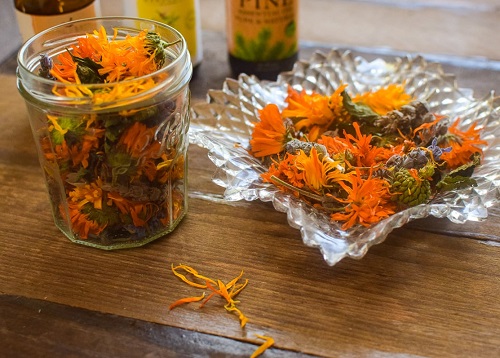
Dry marigold flowers and mix them with other dried flowers, herbs, and spices to create your own fragrant potpourri. Place the potpourri in bowls or sachets around your home for a pleasant and aromatic touch.
3. Bath and Body Products
Incorporate marigold petals into homemade bath and body products. Infuse marigold petals in carrier oils like olive or almond oil to create a soothing and moisturizing oil for massages or as an ingredient in homemade soaps, lotions, or bath salts.
4. Herbal Tea
Use dried marigold petals to brew a soothing and aromatic herbal tea. Marigold tea is believed to have calming properties and is often consumed for its potential health benefits, including supporting digestion and promoting relaxation.
5. Natural Insect Repellent
Create a natural insect repellent using marigold flowers. Crush marigold petals and mix them with carrier oils like coconut oil or witch hazel to make a DIY bug repellent.
Apply it to exposed skin to help keep mosquitoes, flies, and other pests at bay.
Here are the 20 Most Beneficial Garden Insects You Should Avoid Killing
6. Floral Ice Cubes

Add a touch of beauty to your beverages by freezing marigold petals in ice cubes. Simply place individual petals or small flower heads in an ice cube tray, fill it with water, and freeze.
These floral ice cubes can elevate the visual appeal of drinks for special occasions or gatherings.
7. Floral Crafts
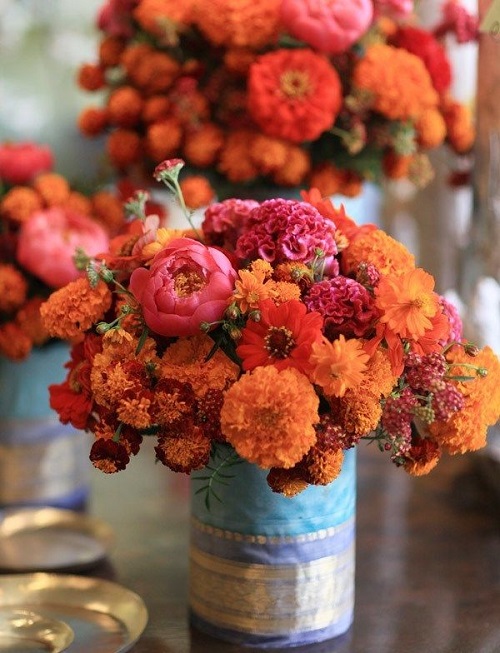
Use dried marigold flowers to create various crafts. Press marigold blooms between heavy books to dry them and use them for card-making, scrapbooking, or as embellishments for homemade candles or wax melts.
8. Edible Decoration
Marigold flowers can be used to decorate cakes, cupcakes, salads, or other dishes. Ensure you use pesticide-free marigolds and use the petals as an edible garnish to add a pop of color and a mild floral flavor to your culinary creations.
Here are 70 Great Edible Flowers To Flavor Your Food and Improve Your Health
9. Scented Candles
Infuse marigold petals into melted wax to create scented candles. Combine the petals with your preferred essential oils to add a delightful fragrance to your homemade candles.
10. Positive Energy

In some cultures, marigolds are believed to bring positive energy and symbolize good luck. Display fresh marigold flowers or hang dried marigold blooms in your home to promote a welcoming and auspicious atmosphere.
Besides these uses, you can also try to make colorful Marigold garlands and Wreaths, like they do in India and South Asia.
Conclusion
Remember to handle marigolds safely, especially when using them for culinary or cosmetic purposes. Use organically grown marigolds to avoid any exposure to pesticides or chemicals. Enjoy exploring the creative and aromatic possibilities of marigolds in your home and garden!

